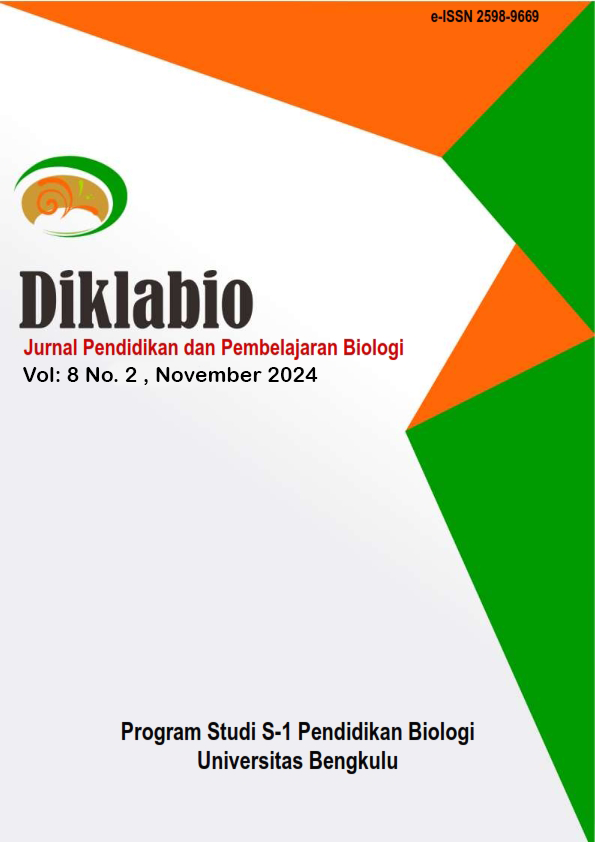Main Article Content
Abstract
Hasil studi pendahuluan menunjukkan keterampilan berpikir kritis dan hasil belajar kogntif siswa rendah. Tujuan penelitian ini adalah menghasilkan produk berupa Mind of Digestive board game berbasis model CBL (Case-Based Learning) yang valid, praktis, dan efektif pada materi Sistem Pencernaan Manusia untuk meningkatkan keterampilan berpikir kritis dan hasil belajar kognitif siswa. Penelitian menggunakan model pengembangan ADDIE yang terdiri dari lima tahap, yaitu Analyze, Design, Develop, Implement, dan Evaluate. Kevalidan media diketahui dari hasil validasi oleh validator media, materi, dan praktisi pendidikan. Kepraktisan media diketahui dari hasil angket respon kepraktisan oleh siswa dan guru. Keefektifan media diketahui dari hasil pretest dan posttest yang dilanjutkan analisis N-gain. Hasil validasi media oleh validator media 96%, validator materi 100%, dan validator praktisi pendidikan 100%. Hasil angket respon kepraktisan oleh siswa 96% dan oleh guru 100%. Hasil uji N-gain keterampilan berpikir kritis diperoleh skor N-gain 0,70 (kriteria sedang) dan persentase N-gain 70% (cukup efektif). Hasil uji N-gain hasil belajar kognitif diperoleh skor N-gain 0,62 (kriteria sedang) dan persentase N-gain 62% (cukup efektif). Hasil tersebut menunjukkan bahwa Mind of Digestive board game berbasis model CBL dinyatakan valid, praktis, dan efektif untuk meningkatkan keterampilan berpikir kritis dan hasil belajar kognitif siswa.
Article Details
Copyright (c) 2024 Putri Emylia Rachmasari, Deny Setiawan

This work is licensed under a Creative Commons Attribution-ShareAlike 4.0 International License.
Starting from Volume 6 Issue 1, the copyright holder of the article is the author
The Journal allows the author (s) to hold the copyright without restriction.
The Jurnal allows the author (s) to retain publishing rights without restriction.
All articles published Open Access will be immediately and permanently free for everyone to read and download. We are continuously working with our author communities to select the best choice of license options, currently being defined for this journal as follows. This work is licensed under a Creative Commons Attribution-ShareAlike 4.0 International License
This work is licensed under a Creative Commons Attribution-ShareAlike 4.0 International License. You are free to:
Share — copy and redistribute the material in any medium or format
Adapt — remix, transform, and build upon the material for any purpose, even commercially. The licensor cannot revoke these freedoms as long as you follow the license terms

